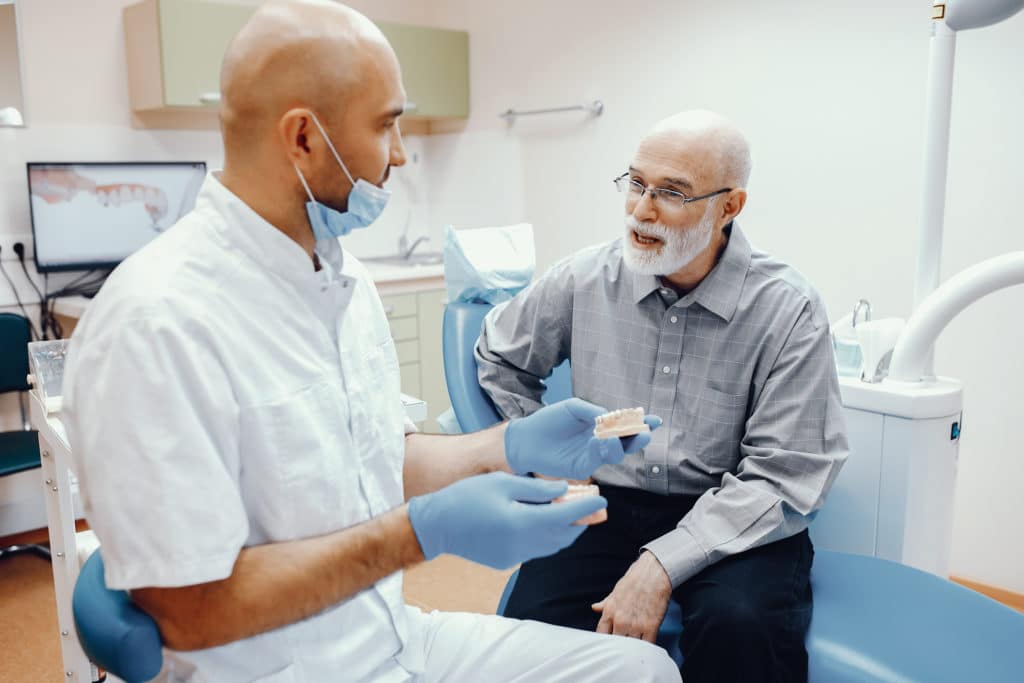Medicare Dental Plans: What You Need to Know
July 3, 2019According to the National Institute of Dental and Craniofacial Research, most people over the age of 65 are missing an average of 13 teeth. In fact, it is estimated that 27% have no remaining teeth at all. Dental problems are among the most common health issues for older adults. A Medicare dental plan can make a huge difference in you having a bright, healthy smile.
Original Medicare (Part A and B) covers very few dental-related costs. Jaw diseases, oral cancer, face tumors, or face fracture-related procedures and infections caused by dental procedures are covered by Medicare Part B. Oral examinations may be covered by Part A if they are related to another hospital stay. However, Original Medicare does not cover important services to prevent or detect severe dental problems such as routine exams or cleanings. Furthermore, Original Medicare doesn’t cover dentures, denture care, fillings or pullings. Medicare Advantage plans can fill in those gaps.
Medicare Supplemental Dental Insurance or Stand-Alone Plans

Even though Original Medicare does not cover the majority of dental services, there are a couple of options for Medicare supplemental dental insurance plans or stand-alone plans to help you save money.
Medicare Advantage
Medicare Advantage (MA) plans are private insurance plans that contract with Original Medicare. MA plans offer the same coverage as Original Medicare, but they can include additional benefits such as dental, vision, and hearing coverage. Some plans even offer coverage for fitness classes!
Medicare Advantage plans may include dental coverage for services including:
- Cleanings (prophylaxis)
- Dental X-rays
- Diagnostic services
- Endodontics (root canal treatment)
- Extractions
- Oral exams
- Restorative services such as fillings
- Periodontics (gum disease and oral inflammation treatment)
- Extractions
- Prosthodontics (crowns, bridges, dental implants, and dentures)
Medicare Advantage dental services typically come with a copay or coinsurance. Your coinsurance will usually be a percentage. For example, you will owe 20 percent of the covered service costs. A copay is a set dollar amount that you will owe for services, such as $20 for X-rays, an exam, and cleaning.
You will usually have a monthly premium with your Medicare Advantage supplemental dental insurance plan, but some areas have plans with $0-premiums.
There may be many MA plans in your area to choose from, and it may seem daunting. A licensed agent with Medicare Plan Finder can help you find a plan that fits your budget and lifestyle. Our agents are highly trained and they are experts in Medicare Advantage. They are dedicated to finding the best plan for you.

Stand-Alone Dental Insurance Plans
Some people may find that Medicare Advantage plans don’t offer coverage for the dental care they need, or that the MA plans in their area don’t offer dental coverage. Those people may find coverage through private dental insurance plans that aren’t contracted with Medicare.
Many stand-alone dental insurance plans cover 100 percent of routine and preventive care, such as cleanings and exams. You will likely owe a monthly premium, but you may save money overall because you won’t have as many out-of-pocket costs.
Dental insurance plans can also cover 70-80 percent of treatments such as fillings or extractions. You may pay 50 percent of major procedures such as crowns or bridges.
Dental Savings Plans
A dental savings plan is much like a shopping club: you pay an annual or monthly fee and you get discounts from a certain group of dentists. This type of savings plan is not insurance, but it is a way to save money on dental care.
Dental Issues Facing the Elderly
Researchers have found links between poor oral health and other health problems such as cardiovascular disease, dementia, respiratory infections, diabetes, cancer, and more. It’s important to be aware of elderly dental problems so you can rectify the issue as soon as possible. Some common problems include:
Darkened Teeth
As you age, your teeth become discolored naturally. When enamel wears away, dark dentin underneath is exposed. These bone-like tissues lie underneath your tooth enamel. Dentin is affected by your diet and medications. Smoking and drinking coffee, tea, and soda can contribute to the darkening of your teeth.
Dry Mouth
Dry mouth is caused by a lack of saliva. As you age, you may start taking more medications which could result in a dry mouth. When our mouths are producing the proper amount of saliva, our teeth are protected from decay and bacteria. Although it may seem like a minor issue, dry mouth can lead to viruses and fungi forming in your mouth. Dehydration from excessive sweating, vomiting, and diarrhea can also lead to dry mouth. Be sure to drink a minimum of 8 glasses of water a day. Water is crucial for dental hygiene. Plus, vital organs in your body perform best when you’re hydrated!
Root Decay
If you do not exercise proper oral hygiene habits, your gums can recede. When this happens, your roots are exposed. Tooth roots are covered by cementum, not enamel. Cementum is responsible for anchoring the tooth to the jawbone. However, cementum is not designed to protect your teeth the same way as enamel. When this part of the tooth is exposed, your risk of tooth decay increases. The naked eye can not see tooth decay, so it’s important to practice good dental hygiene and visit your dentist regularly.
Gum Disease
Have you ever experienced gum bleeding while brushing your teeth? This is a sign that you may be developing gum disease. Gum disease develops when there is an excess of plague caused by small pieces of food being left in your teeth. This is often caused by a lack of brushing or flossing. The risk of gum disease is higher in those who smoke tobacco, have unhealthy diets, or wear poor-fitting dentures. Gum disease can lead to tooth loss and many other health issues in your body.
Oral Cancer
When cells on your lips or mouth have changes in their DNA, a cancerous tumor can form. Oral cancer can appear on your lips, cheek lining, gums, tongue, and top of your mouth. Symptoms include a sore that won’t go away, red or white patches, numbness, and difficulty chewing, swallowing, or speaking. Having a healthy diet and avoiding excess sun exposure to your mouth and lips can help prevent oral cancer or at least limit your symptoms. However, regular visits to your dentist are the best way to find and fix any underlying issues.
Best Oral Hygiene Practices
Proper dental care for seniors and Medicare eligibles doesn’t have to be a daunting task. Spending a few extra minutes a day on your teeth can help prevent some of the common elderly dental problems discussed above. If you’re looking for easy ways to improve your dental hygiene, follow these simple tips:
- Brush your teeth twice per day with fluoride toothpaste
- Floss once per day
- Use an electric toothbrush
- Use mouthwash after brushing your teeth
- If you wear dentures, clean them daily
- Visit your dentist regularly
- Drink plenty of water

Get Medicare Dental Insurance Today
Many seniors and Medicare eligibles may be watching their income, and that’s where Medicare Plan Finder can help. Your agent can help find a Medicare Advantage plan that covers your necessary medical expenses including dental coverage.
When you enlist Medicare Plan Finder’s help, you get an expert in Medicare on your side who can help you weigh the pros and cons of the plans in your area, and help you decide if a Medicare Advantage plan with dental coverage, a stand-alone dental plan, or a dental savings plan is right for you. Call 844-431-1832 or contact us here to learn more today.
This post was originally published on December 13, 2018, by Kelsey Davis, but was updated on July 03, 2019, by Troy Frink.

